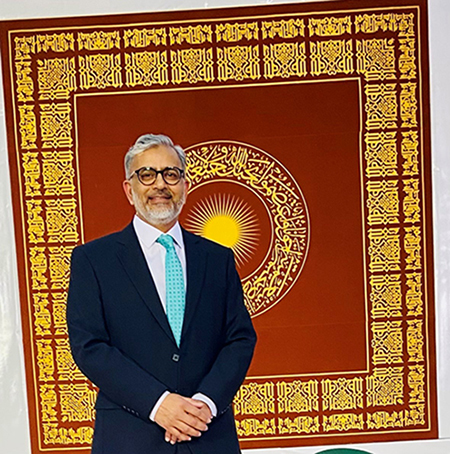ACGME-I Honoring Excellence: Q and A with Muhammad Rizwan Khan MBBS, FCPS, FRCS, FACS, MHPE
This interview is one in a series of interviews with recipients of the 2024 ACGME International Awards. The awardees join an outstanding group of current and previous honorees whose work and contributions to graduate medical education (GME) around the world represent the best in the field. They will be honored at the ACGME Annual Educational Conference, taking place 7-9 March 2024, in Orlando, Florida, US.
2024 ACGME International Physician Leader Awardee Muhammad Rizwan Khan, MBBS, FCPS, FRCS, FACS, MHPE is professor of surgery and associate dean for postgraduate medical education at The Aga Khan University, Karachi, Pakistan. Dr. Khan will also join the Review Committees-International in the 2024-2025 academic year. ACGME-I spoke with Dr. Khan about his career and what receiving this award means to him.
ACGME-I: How did you become involved in medicine, and in academic medicine specifically?
Dr. Khan: I chose medicine quite early in my academic journey and one specific reason was my geographical background, where medicine was considered as an extremely respected profession due to the physician’s ability to help the people in desperate need. It was probably one of the most important decisions of my life and, despite some limitations, my journey has been quite fulfilling so far.
After my graduation from the King Edward Medical College in Lahore, I joined The Aga Khan University (AKU) in Karachi for my training, and this proved to be a turning point for my professional development. The role models I worked with at this institution transformed my thinking and analyzing abilities altogether. The deeply rooted passion for teaching, training, and giving-back ensured that I would only choose academic medicine as my calling, where I could help not only the patients, but also the young physicians and help transform the learning environment for the coming generation.
ACGME-I: What does this award mean to you?
Dr. Khan: ACGME-I is an international organization with high academic standing and standards. Recognition of my academic role and contributions by ACGME-I means a lot to me and I am truly honored. This recognition is humbling as well as inspirational for me to continue to pursue my academic career with even greater passion and enthusiasm. I must acknowledge that this award is a recognition of the whole team working with me at AKU who make things happen every day.
ACGME-I: As this award reflects the contributions you’ve made to GME in Pakistan, what would you consider to be the most important?
Dr. Khan: Enhancement of the clinical learning environment is the key to academic enrichment of the trainees and the quality of care provided to the patients, especially in stressful clinical situations for the trainees. We, at AKU, have worked on several initiatives to improve the clinical learning environment for the trainees. The areas we focused on range from personal wellness of trainees, outcomes-based curricula, faculty development and commitment, as well as the ever-increasing institutional support for the academic programs. The challenges are never ending, especially in a lower-middle income country like Pakistan with limited resources, but one step at a time has kept us moving in a positive direction. I can say with all the humility that the graduate programs offered by AKU are considered as among the best in the country.
ACGME-I: In your view, how has the overall strengthening of GME, especially through international accreditation, benefited Pakistan’s medical education and health care systems?
Dr. Khan: Accreditation of AKU and our training programs with ACGME-I has been a huge success, especially for our trainees. Our programs were already considered as some of the best in the country, but we have introduced quite a few innovations in our programs to bring them up to par with international benchmarks. The areas of intervention range from program-specific rotations, to competency-based curricula, to the development of health care systems. International accreditation not only provided the assurance and satisfaction that our programs are on par with the international standards, but mutual learning helped identify numerous areas for future improvement on various fronts. Excellence is a journey and not a destination, and we must continue working together toward achieving excellence.
ACGME-I: Having played a key role in the evolution of GME in Pakistan, what would you like to see happen in Pakistan’s GME environment in the future?
Dr. Khan: Graduate education and training are the key to the enhancement of specialized patient care in our region, especially in Pakistan. There is a need to develop medical specialists who are not only technically competent but also understand the local context and disease spectrum. My vision is to transform the medical education curricula in Pakistan to an outcomes-based model, resulting in the development of competent specialists who possess the leadership skills to transform the health care systems and benefit the most deserving people in the country and the region.
Read more about the winners of the 2024 ACGME International Awards, as well as recipients from past years.
Learn more about the ACGME International Awards and consider nominating a deserving GME community member for one of the 2025 Awards. The nomination cycle will open after the ACGME Annual Educational Conference.

